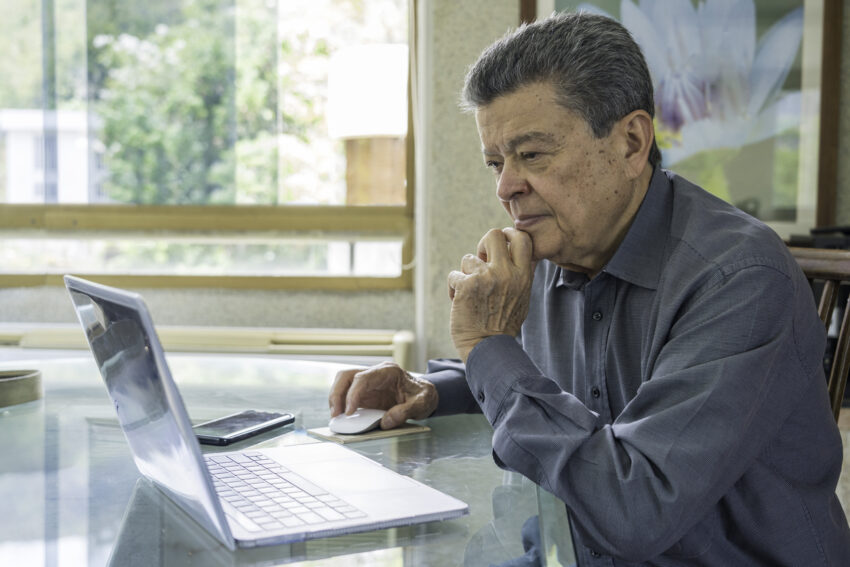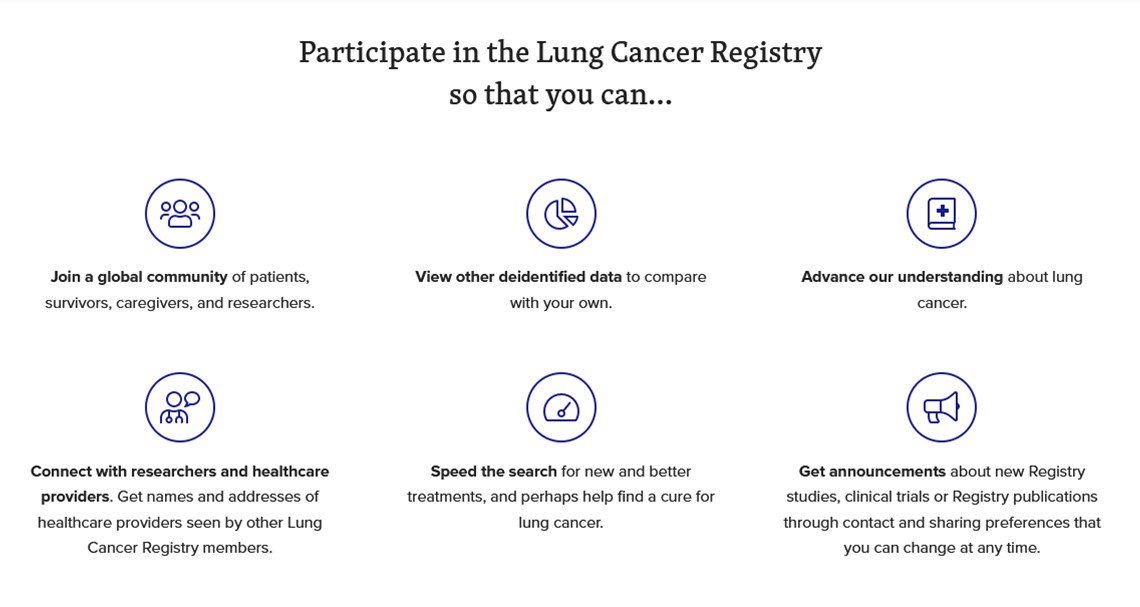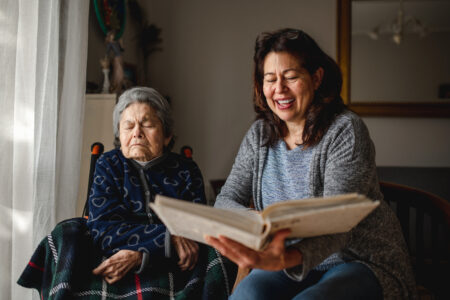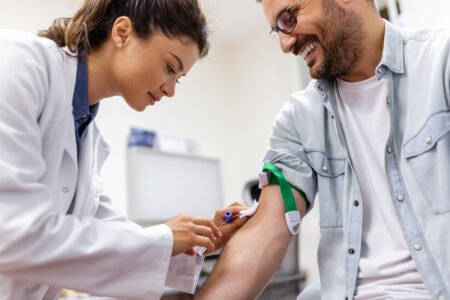
Share On Social!
Researchers need your help as they seek to better understand how lung cancer impacts people differently and how to improve treatment and quality of life.
That’s why the GO2 Foundation for Lung Cancer started its Lung Cancer Registry.
The international Lung Cancer Registry, available to join now, aims to double the 5-year survival rate of lung cancer patients from 20% to 40% by 2025.
“By sharing your lung cancer story, contributing your experiences as a person with lung cancer or a caregiver of someone with lung cancer, you are helping the research community develop new treatments,” according to GO2.
Let’s dive into more about the registry, how you can join, and how it can help Latinos.
Joining the Lung Cancer Registry
Participants interested in joining can register a free and secure account.
“When you submit information to the Lung Cancer Registry, it will be stored and maintained in a secure, password-protected database, assuring the privacy, security, and confidentiality of all personal information,” according to GO2. “Only approved researchers can access the data, and all identifying information has been removed.”
After that, participants can share their experiences in brief surveys.
“We find connections, trends, and clues to help answer big research questions,” according to GO2.
Participants are eligible to join the registry if they:
- Are at risk for lung cancer (this could be due to family history, exposures or smoking history)
- Have a lung cancer diagnosis, are age 18 or older, and able to make your own medical decisions.
- Represent a child or dependent who has a lung cancer diagnosis and for whom you can legally make medical decisions.
- Are a caregiver for a person who has a lung cancer diagnosis.
- Represent someone who had a lung cancer diagnosis and is deceased.
“The medical data from more than 2,500 patients and survivors from around the world has been compiled into one rapidly expanding database,” according to GO2. “Researchers and clinicians from all specialties in lung cancer—medical oncology, surgery, radiation, drug development, and quality care improvement—can access de-identified data that maintains individual patient privacy.”
For questions or help about joining the registry, call 1-800-298-2436 Monday through Friday from 9 a.m. to 5 p.m. ET or email support@go2.org.
How Lung Cancer Impact Latinos
In the case of Latinos, lung cancer is the leading cause of cancer deaths for men and the second-leading cause of cancer deaths in women.
Health disparities plague the Latino community, especially when it comes to cancer.
A 2021 report from the American Lung Association found that the compared to white people in the United States, Latinos are:
- 16% less likely to be diagnosed at an early stage
- 26% more likely to not undergo any treatment
- 16% less like to survive five years after diagnosis
Other disparities can come from factors like lack health insurance, language barriers, and social determinants of health like transportation challenges and issues with access to healthcare and preventive screenings.
Healthgrades suggested ways to improve lung cancer outcomes for Latinos by continuing to decrease smoking rates, improving early detection of lung cancer, increasing representation in clinical trials.
Get Help Quitting Smoking and Reducing Lung Cancer Risk
Searching for a convenient and free program that will help you quit smoking?
Try Quitxt!
Quitxt is a bilingual service from UT Health San Antonio and the Cancer Prevention and Research Institute of Texas that sends texts messages to smartphones to help South Texas adults quit smoking.
Messages from Quitxt help with motivation to quit, setting a quit date, handling stress, and using nicotine replacement, if needed.
To join Quitxt in English, text “iquit” to 844-332-2058.
For Spanish, text “lodejo” to 844-332-2058.
A study found more than 1 in 5 Quitxt users fully quit smoking after completing the English version of the program, said Dr. Amelie Ramirez, director of Quitxt and Salud America! at UT Health San Antonio.
“There’s no better time than now to stop smoking with help from Quitxt,” Ramirez said. “Quitting smoking is proven to improve your health, increase your life span, and save money.”
Visit the Quitxt website for more information and tools in both English and Spanish that can help you or someone you know quit smoking today!
The Need for Latino Representation in Research
While disease like lung cancer deeply affect the Latino community, less than 10% of volunteers in cancer clinical trials are Latino. 
Latino participation in clinical research is important.
It can help researchers better develop and understand treatment going forward, said Dr. Patricia Chalela, associate professor at the Institute for Health Promotion Research at UT Health San Antonio.
“Cancer hurts many of our abuelos, moms, dads, and others we love. Clinical trials help us fight for our familia,” Chalela said. “Latinos who volunteer in clinical trials are helping themselves. And they’re also building a future with better treatments that can help their families in the years to come.”
Chalela and Ramirez are helping Latinos volunteer for cancer and Alzheimer’s clinical trials.
Through Salud America!, they are highlighting open clinical trials, conducting webinars, and sharing stories of real Latino clinical trial participants to overcome clinical trial barriers. This work is supported by Genentech, a member of the Roche Group.
For example, take Alma Lopez.
Lopez was first hesitant to participate in clinical trials when she was diagnosed with breast cancer and began weighing her treatment options.
But after giving a clinical trial a chance, she is now cancer-free and healthy.
“If we don’t participate, it won’t help the doctors to understand our problems,” Lopez said.
Become Part of the Avanzando Caminos Study
Are you or someone you know a cancer survivor?
Join the Avanzando Caminos study at UT Health San Antonio.
The Avanzando Caminos study aims to enroll 1,500 Latino cancer survivors in South Texas and 1,500 more in Miami to better understand the Latino experience after cancer.
Avanzando Caminos volunteers should be:
- Age 18+ and able to read in English or Spanish
- Willing to attend study visits
- Completed primary treatment for breast, colon, kidney, liver, lung, prostate, stomach or uterine cervix carcinoma in past 10 years
- No severe cognitive impairment or inpatient psychiatric treatment in past 6 months
Volunteers receive $50 per visit.
Find out more information in English or Spanish.
To volunteer, contact Dr. Ramirez’s Avanzando Caminos team at the Institute for Health Promotion Research at UT Health San Antonio at caminos@uthscsa.edu or 210-562-6514.
By The Numbers
10
Percent
of clinical trial participants are Latinos



